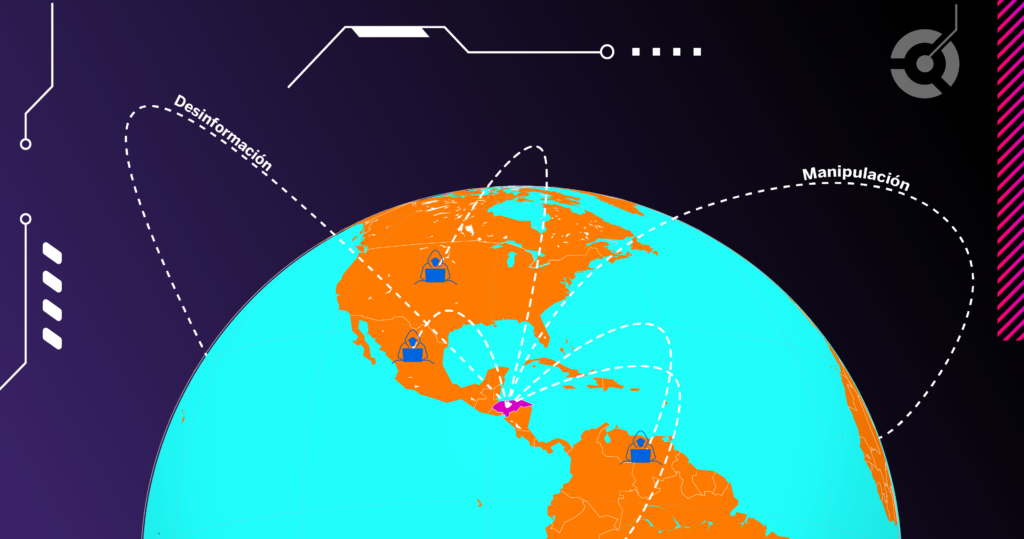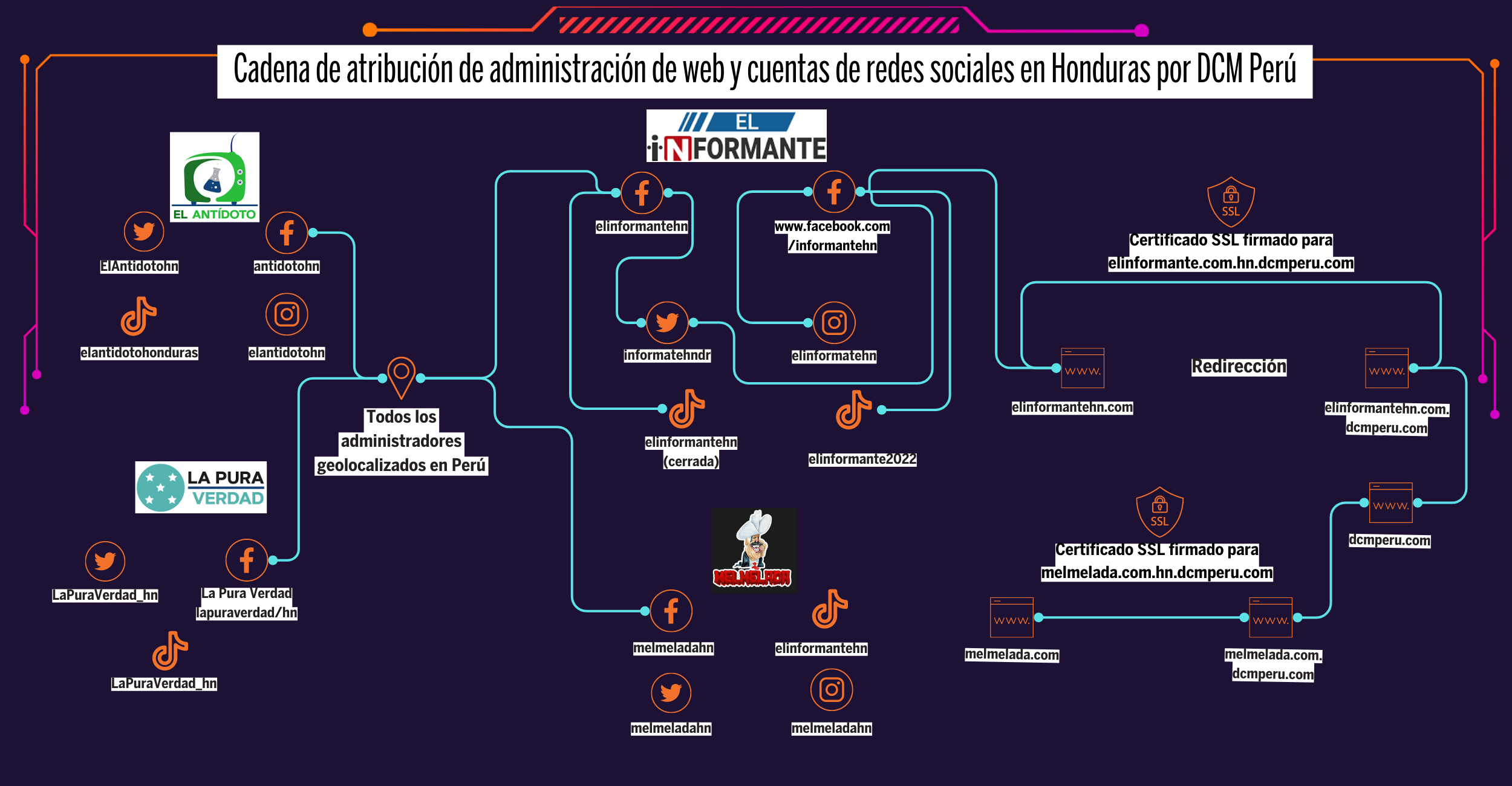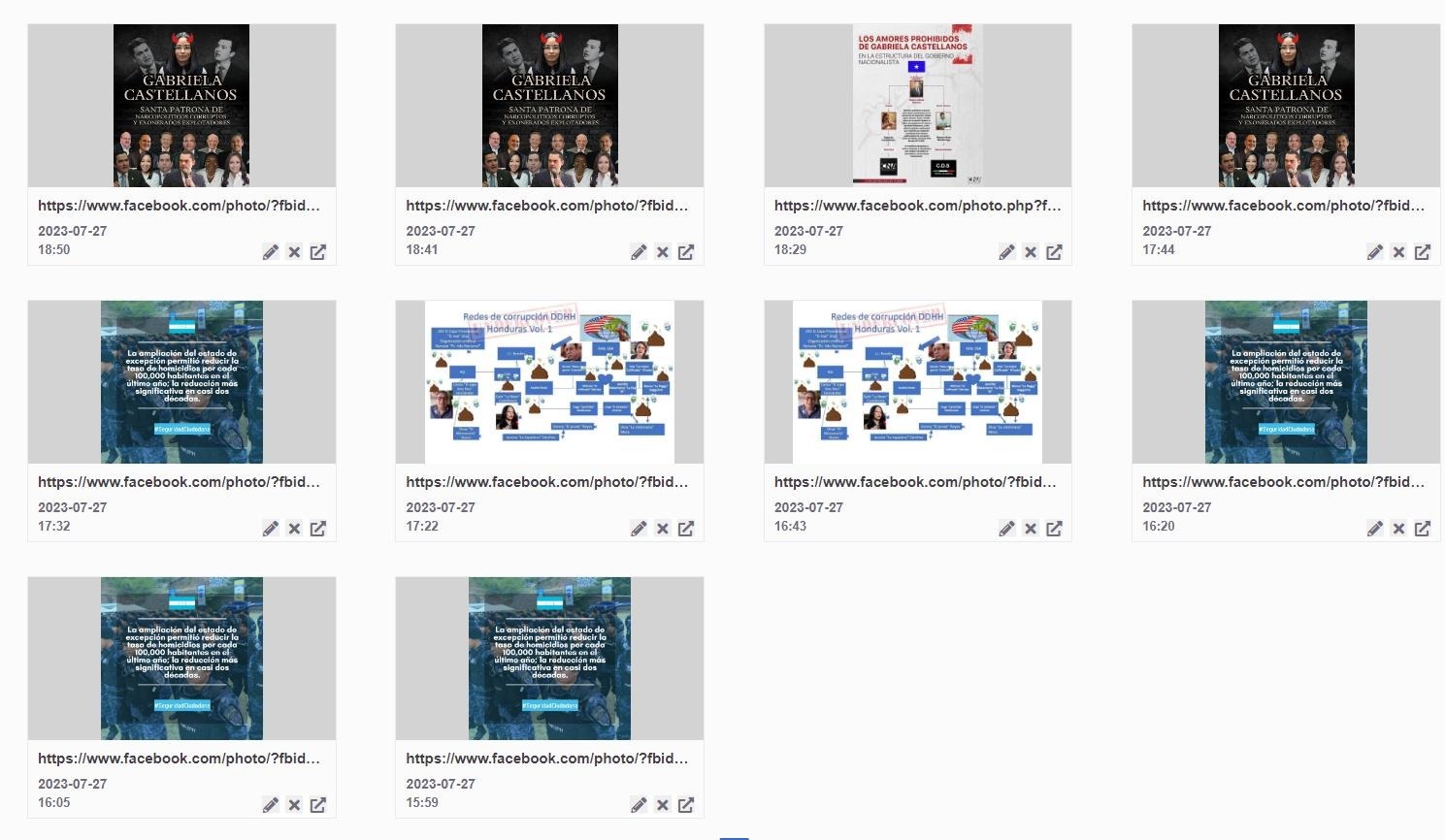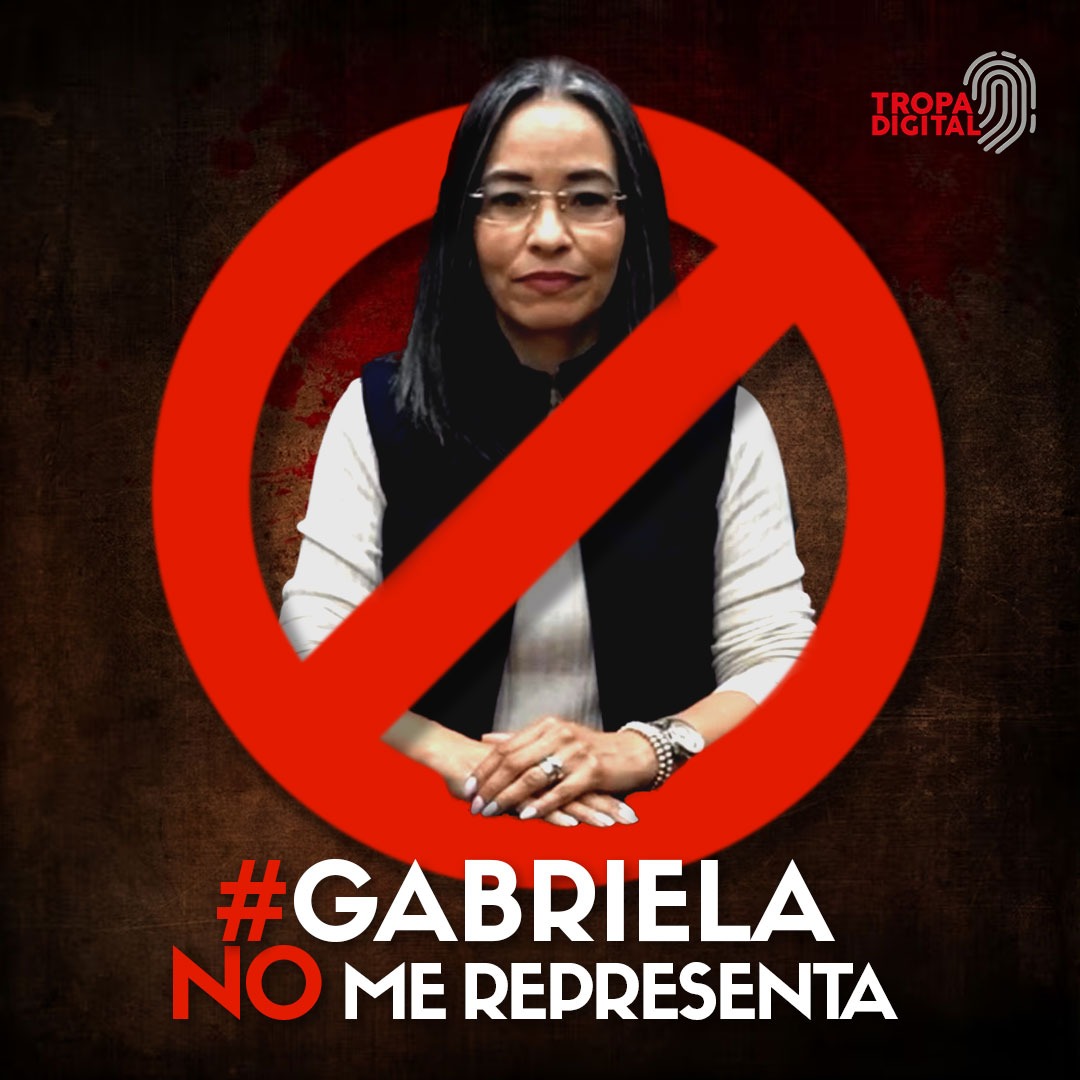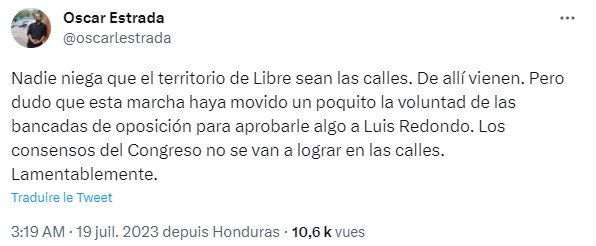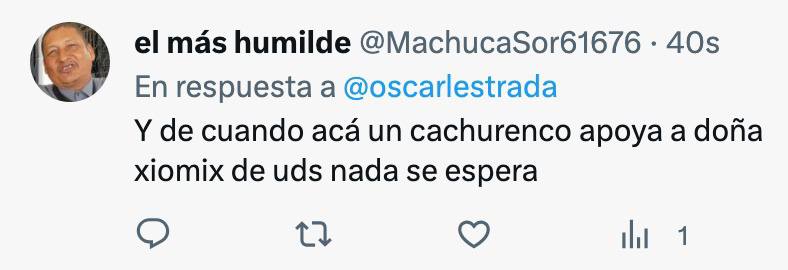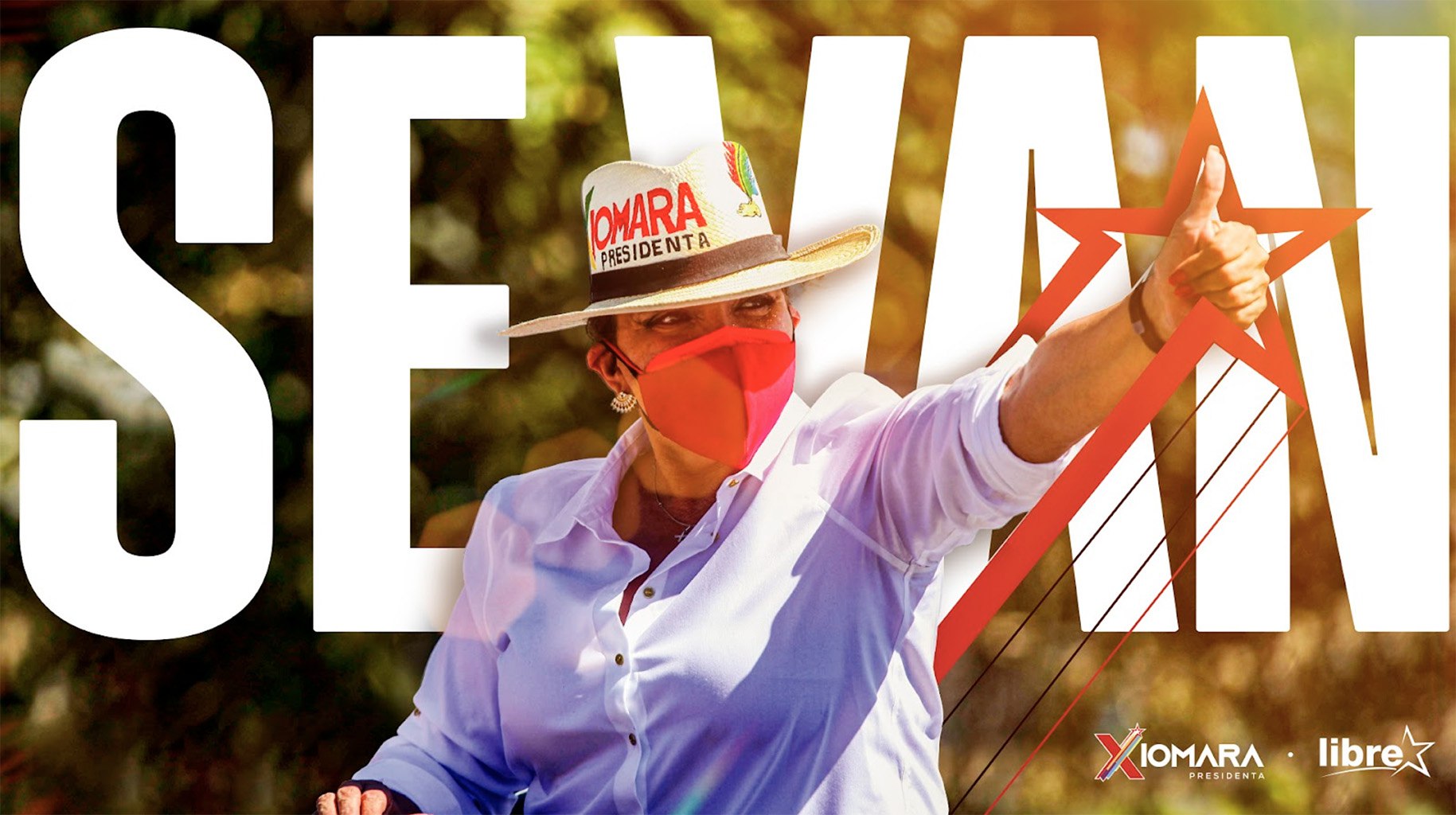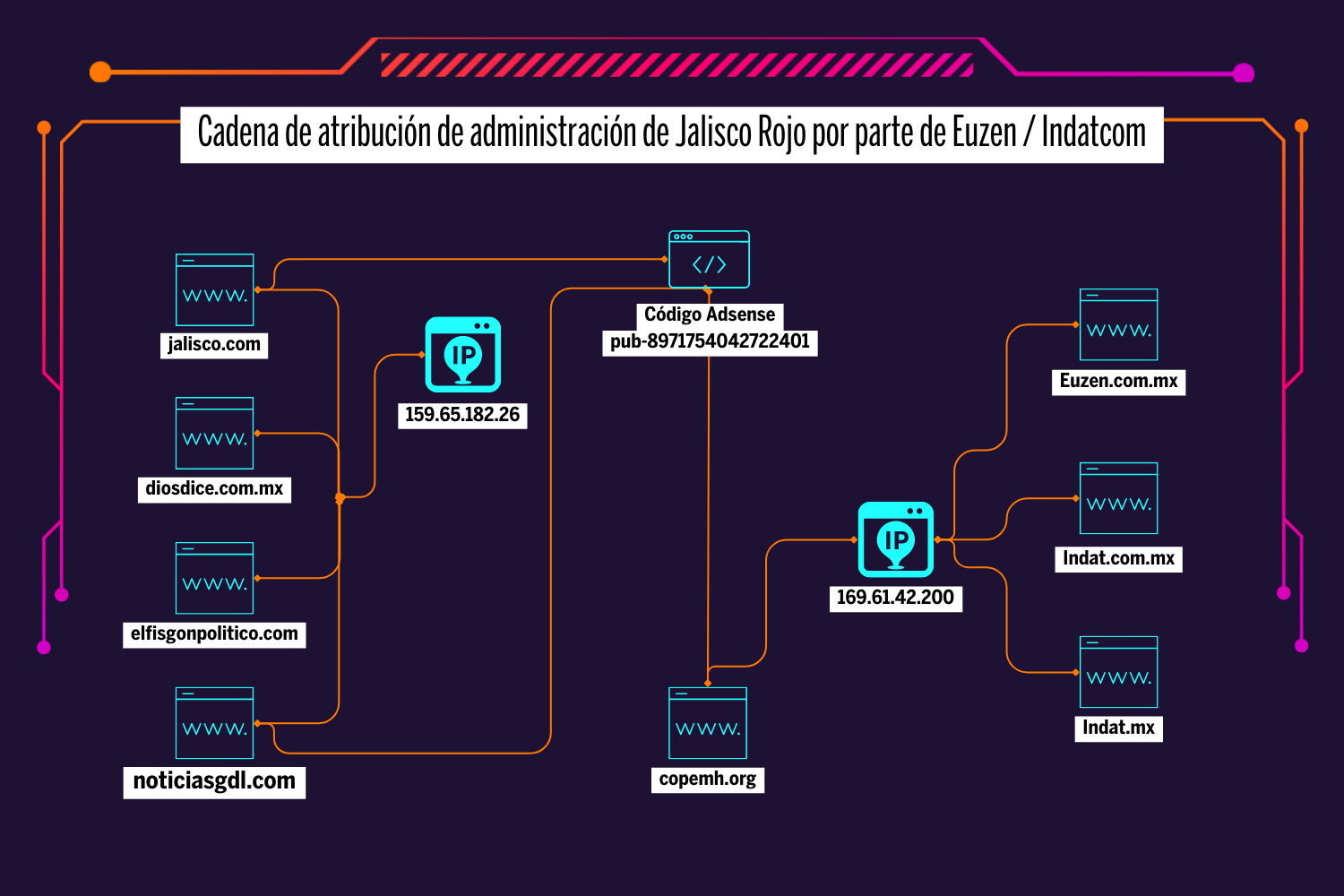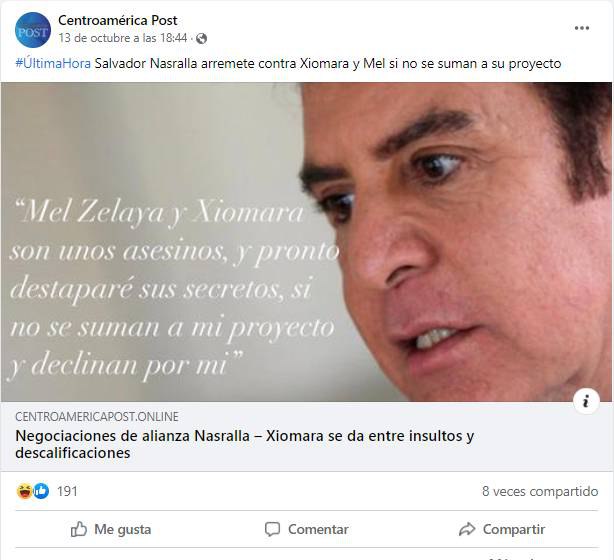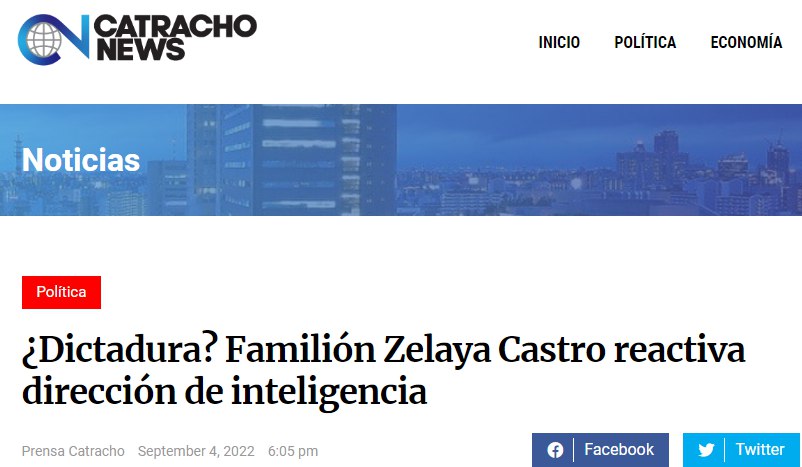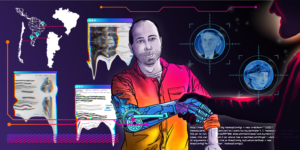They come from Colombia, Spain, the United States, Peru, Mexico, or Israel. They flourish in electoral campaigns. They are political consultants. This investigation reveals unspeakable secrets from international corporations that sold influence and victories in Honduras. Without regulations or transparency, it is unsurprising that Honduras holds the record for the most eliminated social media accounts in the Central American region for its involvement in coordinated and inauthentic disinformation campaigns.
Text: Celia Pousset (Contracorriente)
Technical Analysis: Aldo Salgado (Laboratorio Ciudadano)
In Collaboration with: Andrea Rincon (Cuestión Pública)
Edited: Maria Teresa Ronderos (CLIP) and Jennifer Avila
Graphics: Daniel Fonseca
Translated by: Jorge Paz Reyes
On July 8, Hondurans awoke to unusual news: an attempt to kill the President of Congress, Luis Redondo, by putting ground glass in his food. It seems like one of those fake news that we talk about so much, those that take over social media platforms, and journalists have to clarify. But no, this time it was not a lie. The attempt was confirmed through a National Police press release, which also announced the start of an investigation. A few days later, the «news outlet», Melmelada, published on its Facebook page a montage of Luis Redondo on the toilet with a very fine description: «After the alleged “attempt” with ground glass, the illegal Redondo lives locked in the bathroom doing what he does best, shitting it».
On the same news, El Informante, a «news outlet» that upholds a more serious tone, commented: «As expected, the illegal Luis Redondo did not go to any public health clinic after allegedly wanting to be poisoned with ground glass, but instead went to a luxurious private hospital in San Pedro Sula».
Melmelada’s website informs that the news outlet is based in San Pedro Sula and El Informante’s page says it’s in Tegucigalpa. In their respective Facebook accounts, the former indicates: «We do political satire» and the latter affirms that they are the official account of the media outlet El Informante. However, they both hide the fact that they were created in Peru and are currently managed by a Peruvian company, DCM Peru, an «integral digital communications agency».
This finding from Contracorriente and Laboratorio Ciudadano is part of the investigation Mercenarios Digitales [digital mercenaries], led by the Latin American Center of Journalistic Investigation (CLIP) in alliance with other 20 media outlets and four digital investigation organizations in which we tracked the possible links between communication companies and misinformation.
In this case, we were able to prove a direct connection between these two media outlets, which have Twitter, Facebook, and tik-tok accounts, and the DCM Perú agency through an analysis of web domains, since the domain of the web page of DCM has two subdomains:
melmelada.com.dcmperu.com and elinformantehn.com.dcmperu.com.
Moreover, we proved that DCM Peru has been paying for advertising in Meta for some of its publications since December 2022.
In Honduras, in only four years, various social media platforms did massive shutdowns of accounts because they considered that they were engaged in coordinated inauthentic behavior and could be fake. Facebook shut some accounts down in May 2019, December 2021, and May 2023. Twitter did so in April 2020 and August 2022.
In no other country in Latin America have these platforms eliminated so many disinformation operation networks in such a short time as in Honduras. With this evidence, this journalistic alliance set itself the task of finding out what happens in this country that produces so much false or inauthentic information. To do so, we tracked thousands of accounts and domains, made requests for public information, consulted advertising payments to social media platforms, and managed to interview, among other experts on the subject, four people, a consultant for a political communications firm, a former employee of another and two activists who made propaganda in social networks. These interviews revealed many of the tricks and tactics of how these coordinated networks operate.
Many coincided with one answer: Multiple political communication companies and consultants have arrived in Honduras to experiment, and with the lack of regulation of what’s allowed in the digital world, they operated without any restrictions.
Influencing at all costs, a lucrative activity
What does a communication consultant do? What methods do they use to influence public opinion? How did social media platforms become the main battleground in the political war? Behind every story published in the digital ocean, there is an author or a «creator». It may be an activist who does it for free, but often the mastermind of a campaign is a communications consultant hired by a candidate or a political party.
One of these consultants agreed to speak to this journalistic alliance openly and without revealing his name. «Disinform? We all do it», he said, referring to these fellow political marketing experts. «Part A is to construct an attractive and identifiable character for voters. If one is water, the other has to be the oil. It’s the law of contrast. Part B is to discredit the other candidates, using different recipes. We don’t do that work, but there are other more informal companies that we subcontract. It is quite easy here in Honduras. There is no interest to regulate».
The consultant said that this B-side includes, for example, the manipulations of polls and the identifications of influences who can be paid to spread a message. «The important thing is to know who is going to spread the message that matters to us», he said.
The consultant explained that they charge five thousand dollars to give a report to a client, which contains what is said about him in networks and the buzz his name generates. But they did not want to disclose what is paid for the services of these clandestine campaigns.
Judging by the content they release, in the case of DCM Peru we can suspect that the client is an opposition party to President Xiomara Castro’s governing party, Libertad y Refundación (Libre), or a specific candidate, but there is no proof. The contract or receipt is almost always the missing piece or perhaps the non-existing piece. The consultant explained that it is almost impossible to track the links between the communication agency and a politician because «there are no transactions, no contracts. There are multiple methods that I won’t reveal to you. But I will tell you one. There are intermediaries. Instead of directly financing a political campaign, a businessman hires the services of a communication agency, officially for this business communication, but the real client is the politician. That’s a very common model».
We contacted the DCM Peru agency to find out who their Honduran client is, but to this date, we haven’t gotten a response.
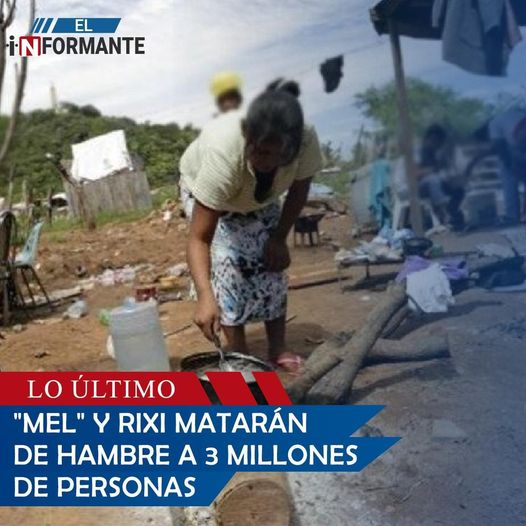
Some consultants do not have any reservations about describing the methods they use. That’s the case of Argentine Diego Panigo, who was an advisor to the alliance between Libre and el Partido Innovación y Unidad (Pinu) and of its candidate in the 2017 elections, Salvador Nasralla. The Argentine consultant publicly highlights that the «five pillars of any modern electoral campaign must take into account fake news, information warfare, digital emotions, data mining, and neuromarketing.
Panigo worked in Honduras with the Infocus Group. Michelle*, a former employee of that agency, told Contracorriente that she was in charge of bots, fake accounts, and the recruitment of digital guerrillas. Ruth Morazán, Panigo’s business partner, and ironically the administrator of the Twitter account called Antibots, was the one who contacted her to join the project. At the time, in 2017, Michelle was posting in favor of candidate Nasralla and Ruth invited her to Twitter and WhatsApp groups that distributed content in favor of the politician. They ended up hiring her.
Michelle reassured us that everything was paid with checks or in cash, from person to person, and they never use the name of the company or of the political party.
Diego Panigo promised Contracorriente multiple times either a personal interview or call, but he never showed up to the appointments.
The defense of a candidate on the campaign trail
These practices are common in the political dynamics of Honduras. The same happened with the Liberal Party during the 2021 presidential campaign, in order to defend Yani Rosenthal after he was convicted in the United States for money laundering linked to drug trafficking. Another source, who also spoke to this team without revealing her name, told us that she worked voluntarily without being paid, in what she calls «the party’s gray campaigns».
She was mainly in charge of spreading narratives on Twitter and Facebook. «We invented surveys, we spread news that Libre’s call centers were financed by Venezuela. It was not true information, but it created an echo in Honduran society. The campaign commission had its war room that decided on the content to be disseminated. The group in charge of Facebook was called La Tropa, that group was led by the congresswoman who was killed, Carolina Echeverria. Basically, we attacked everyone who attacked Yani. The common targets were Xiomara Castro and Luis Zelaya, whom we tried to neutralize with the issue that he left his mother without a house. There was a physical call center run by Yani’s daughter in San Pedro Sula, but it no longer exists”, reported the volunteer.
The activist explained that there were 40 people who managed the social media accounts. «At the beginning of the campaign, they asked to help organize the youth at the national level. In the WhatsApp groups, I started contacting young people number by number, I would ask them their name and place of birth, and I would open a Twitter account for them. I started to demand every member of the group to support us. It worked, I was able to make Yanni trend twice a day».
Yani Rosenthal’s assistant, Carlos Bonilla, proposed to this media outlet to interview the Liberal Party’s campaign chief to ask her about these accusations, but despite several attempts, she did not answer.
The volunteer party activist also said that it was a member of the Libre Party who helped her build her social media tools because they were both in opposition to the National Party. «We coincided in attacking the National Party and so she started to give me advice on how to organize a network, have bots, etc…».
Contracorriente contacted this Libre activist who admitted to having managed an account in favor of the Libre Party on the eve of the presidential elections. «I’m telling you, I never worked for Libre’s social networks. Everything was born organically, during the campaign. It was done out of the need to defend what a group of young people believe is a project for change. The trend was #FueraJOH, but it was nothing as organized as people think».
The new «digital troops» of Xiomara Castro’s government
The attacks on social media platforms to discredit a political opponent are not always a service offered by a communications consultant firm, they can also be the work of officials and militants of a political party. The new government has been pointed out for implementing such measures in its official communication. The government of President Xiomara Castro has the Department of Press, a minister consultant in communication and strategy, a national commissioner, and a press office that by May 2023 had 223 employees in the government social media platforms, media monitoring teams, and spread of social media campaigns, according to the Transparency Portal of that institution.
One of the coordinated campaigns that was corroborated by this journalistic collaboration, had a high participation of militants and officials of the Libre Party. The militants spread on social networks the hashtag #GabrielaNoMeRepresenta after the official speech against Gabriela Castellanos, president of the National Anti-Corruption Council (CNA) who had denounced death threats after presenting a report on the concentration of power and nepotism in the current government. Several of the images disseminated both on Twitter and Facebook have the logo “Tropa Digital” [Digital Troop] and were disseminated by accounts of Libre Party militants and by content creators on Facebook who are entirely dedicated to spreading government propaganda campaigns. Most of the active accounts were created between 2022 and 2023.
Cesar Espinal, coordinator of the Observatory for Anti-corruption Criminal Policy of the CNA, commented that they had identified a «line of attack in social media networks that came from the government». There is a dynamic in Twitter driven by the members of the State, such as the Chancellor of the Republic or the Undersecretary of Press, who are voices of authority from the government. Many people who are under their orders have to amplify the discourse even though they do not know the context», he explained.
Espinal added that «after publishing the report about the concentration of power in the government, Castellanos had to leave the country due to death threats. When she returned to Honduras, the Chancellor, the husband of the President and former president Manuel Zelaya, and the President herself tweeted and it was like an order: “I tweet, everyone tweets”. All the ministers and then the militants started tweeting. They are not creators of information or opinions, they don’t mind reproducing the government’s discourse. They even made a photo montage of Gabriela and her family to suggest that they were on vacation and not for security reasons. But the photo is not from this year, and they changed the background of the photo to erase some people. This is surely part of a government plan against any critical voice that they perceive as opposition».
A similar phenomenon occurred in Venezuela where President Nicolas Maduro relied on his digital troops to spread propaganda and misinformation. An investigation from the group Cazadores de Fakenews [Hunters of Fakenews], tracked those digital soldiers on social media platforms who were in charge of controlling the narrative and public opinion about Venezuela.
¿Realmente luchan contra la corrupción? Sus acciones hablan más fuerte que sus palabras. #GabrielaNoMeRepresenta pic.twitter.com/TtpnedpZG6
— Manuel Senteno (@ManuelSenteno1) July 21, 2023
Another person who has identified several smear campaigns and who points out that these could come from the current government is the writer and analyst Oscar Estrada. According to him, these campaigns are being carried out by Luis Redondo, the current president of the National Congress, and Carlos Zelaya Rosales, the brother of former president Manuel Zelaya and current vice president of Congress. “Sometimes I publish things just to provoke them, [the party militants], and make them evident, so I can block them,” Estrada explained. “Sometimes it happens that some minister posts something on his profile with some bloody comment and then the bots are activated”, he explained. This is an example he showed us:
Recently, Estrada denounced on his Twitter account a smear campaign against human rights defenders and people from civic organizations done by activists and officials from the current government.
Maribel Espinoza, congresswoman of the Liberal Party, denounced that she is «the object of a hate and disinformation campaign orchestrated by Libre sympathizers and officials». She accuses Amable de Jesús Hernández, the country’s minister of public works and mayor of the municipality of Colinas, Santa Bárbara, and Fabricio Sandoval, vice president of the National Congress, as the main organizers of that campaign. «You only have to see my Twitter and Facebook and you will realize that I am accused of being a coup plotter, representative of power groups, and part of the narcodictatorship,» she said.

The minister in charge of the Press and Information Office, Ricardo Salgado, told Contracorriente that the government of President Xiomara Castro is under constant attack by the political opposition and that his office, which has the budget to develop communication policies, is trying to respond to the possible «destabilization» being coordinated by civil society actors such as the CNA. For this, Salgado explained that they have about 30 people hired to monitor digital media and social networks to identify these attacks and be able to respond. And that they have a team of «no more than five people» to design messages and communication strategies.
«In the monitoring we do we can see the topics that are being introduced by the accounts, and there is a separation because there are digital media that are dedicated to that, there are accounts created by people who react organically, they are trolls, but there are also digital media outlets that are dedicated to that, few have informative structure, they are known as the «washazos», pages where gossip arrives and throw them through the networks,» he explained.
But he also confirmed that it is the government that provides information and also has a national network of activists who organically replicate government content, i.e. digital troops.
«We have a plan, we have a team and we have something that is the most precious experiment because there are many people scattered throughout the country who are not employees but are militants, those must be about seven or eight thousand people, they have motivations, they are given training courses, they are prepared, they are spreading the plan, the brand, we tell them to stick to it. Those are the digital troops. There are people who give the key and the others go out, we feed all these troops with information, it is forbidden for them to report something about something they do not know,» he added.
Regarding the hashtag #GabrielaNoMeRepresenta [Gabriela does not represent me] said: «They are good, they positioned it, we position hashtags every day. In practice we have a lot of capacity in that” and said that he does not consider it a smear campaign because “in reality, she does not represent me and I have the impression that she does not represent you either, she represents the interests of the US embassy and the interests of the highest lobbies of the right-wing in the United States and she is working here to destabilize the government. Those are the interests she represents, it is not discrediting, it is the truth».
In addition, Salgado said that the CNA’s campaign against the government has been more aggressive, false, and infamous. «Gabriela Castellanos alone does not have the strength to do anything but the two organizations here that have the muscle of the United States are: ASJ (Association for a More Just Society) and CNA,» he said.
But we also identified that there was coordination in the dissemination of an image of mockery against the CESPAD organization that called for a demonstration in favor of the anti-corruption struggle demanding an International Commission Against Impunity in Honduras (CICIH).
To this, the minister responded that «the biggest funder of NGOs in the world is the Rockefeller Foundation, 80% of the NGOs have a ticket from that foundation. CICIH’s claim from CESPAD arrived and it was the same thing we were claiming, and we did not ask them to suspend their demonstration, we joined, because we can mobilize people and not because we are in the government, we have always mobilized people»., he said.
He also assured that a «think tank of the ultra-right in the United States is manipulating and has direct contacts with the Honduran elites who at the same time control the entire media agenda that replicates the spokespersons of the oligarchy. The National Party, for example, with the Liberal Party and Salvador Party of Honduras are in close relationship with a Republican alliance, which is ultra-right, so extreme that Trump is a pale bird next to them».
We contacted the national commissioner in strategy and communications, Geovanny Domínguez, who did not continue to answer our messages after requesting an interview. We wrote via WhatsApp to the President of Honduras, Xiomara Castro, to ask her if she is aware of the campaigns that developed after her comments on social media platforms about Gabriela Castellanos, but we did not get a response. We tried to contact the president through her son, the private secretary of the presidency, Hector Manuel Zelaya, who also did not respond.
Euzen: the consulting firm of Xiomara Castro’s government questioned in Mexico
The Mexican consulting firm Euzen advised Xiomara Castro in the 2017 and 2021 presidential campaigns. In addition, it worked during the first months for Castro’s government and for the Mayor’s office in Tegucigalpa. The agency was born from an internal rupture in the political communications firm Heuristica in 2012, the founding partners of the two consulting firms are Jose Luis Valencia and Rafael Valenzuela.
According to a source close to the current administration, Euzen’s links in the government are the sons and daughters of President Castro and her husband Manuel Zelaya, the former president ousted in 2009. «The President and the entire government were direct clients at the request of Mel [Manuel Zelaya’s popular name]. The former president gets along very well with the president of Movimiento Ciudadano, the Mexican political party advised by Euzen, that is how they contacted them,” said the source close to the current Honduran government». The source explained that the work consisted of building the Libre party’s brand manual, which cost around 500,000 lempiras (about US $20,000 today), but the content is a confidential matter. He also said that another important work that was done was to present what he called «the start-up of the government, the set of projects with which the government has to start, and the recommendations on the image of each person».
He said he was not aware of how much the government paid Euzen, but the consulting firm suspended its services «after months of unpaid work began to stack up, they decided to put the consultancy on hold, and it was agreed that it would be resumed in the pre-campaign that will start normally at the end of this year [2023]». The next presidential election will take place in 2025.
We requested in the transparency office of the President’s House the communication contracts of the current government, but we did not receive a response despite having filed a formal request to access the information.
Euzen has the same IP address as other Mexican companies called Indatcom and La Covacha. In Mexico, a journalist revealed that the Indatcom agency has an internal unit called «Machete» which, she found, is in charge of counter-campaigning through fake media that operate or have operated in the state of Jalisco. The Laboratorio Ciudadano team also discovered that Euzen.com.mx and Indat.com.mx share the same IP address and that the Mexican propaganda media pages -jaliscorojo.com, diosdice.com.mx, noticiasgdl.com, and elfisgonpolitico.com- are connected by Adsense code to the corporate pages of Euzen and Indatcom. Adsense is a Google platform to place advertising on web pages and works with a unique identifier so it can be deduced that the pages share a unique administrator and, in this case, establish the link between the companies and the fake media.
Euzen’s relationship with La Covacha and Indatcom is complex. According to testimonies of former employees at those companies, Mexican media companies documented that Rafael Valenzuela manages the three companies; but according to Valenzuela, are solidly allied companies since 2011, «we have an exclusive agreement between us dealing with political communication. In Euzen we handle the political and communication strategy. La Covacha works on audiovisual production. Indat is in charge of communicating on digital platforms».
Another activity that helped determine that the companies were related to each other is that unlike Heurística (the firm that gave rise to Euzen), these three agencies only work with municipal and state governments linked to the political party of Movimiento Ciudadano (the governing party in the states of Jalisco and Nuevo León). When reviewing the contracting of municipal services, it can be seen that all three are always contracted simultaneously. But each one charges for its own account. Euzen charges for elaborating project concepts, Covacha for carrying them out, and Indatcom for distributing the content on social media.
The source close to the current administration said she was unaware of such working methods by Euzen in Honduras since no branches were created in the country. Furthermore, according to her, Libre’s call centers are a government initiative and not a recommendation or a service of the consulting firm.
«There are different groups, for example, one for Luis Redondo, one for the President, another for Hector Zelaya, all have groups that are responsible only for that», she said. «Those people are part of a collective that manages fake accounts and bots to throw aggressive communication. They do it for free, with the political obsession of refoundation. The party makes them believe in them, that they are important.»
We tried to contact Luis Redondo, Xiomara Castro, and Héctor Zelaya, but we did not get a response.
The source thinks that «Euzen’s work fell apart little by little due to the changing character of Manuel Zelaya because before there was this narrative of empowering a resilient woman, the mother that Honduras needed, but after the crisis with Jorge Cálix and Beatriz Valle and the rhetoric that they are traitors, the obsession was the idea of refoundation. And they then stopped listening to Euzen».
According to the source, Euzen did not want to use call-center network attack techniques because that had been the National Party’s strategy over the years; but in the end, with or without a consultant, that’s what happened.
This journalistic alliance contacted Euzen via email and through its website to talk about its communication strategies and methods in Honduras. We asked how much a government contract is worth and what services are offered, as well as if they used methods similar to those used in Mexico. By the time this investigation was published, we had not received a response to these questions.
For his part, Minister Ricardo Salgado told Contracorriente that he does not know anything about the contract with Euzen but that he was involved in the campaigns of the Libre Party and the experience with political communication agencies is that “it is difficult for a company of this type to be hired here because there is no will to submit to the narratives or be puppets of an advertising company».
«What these companies tell us is that we should not confront, that we should be lukewarm or cold, that what reaches the middle class is that discourse of consensus. What marketing wants is to sell a product but what we are betting on is to change Honduras, we do not want to arrive on a different kind of packaging and be the same as others, it is not the image we want to project, the image we project today is what we want», he explained.
President Xiomara Castro’s image has been decreasing in popularity according to polls, the last one by Latinobarómetro places her with 36% popularity. According to Salgado, this is due to the aggressive campaign against the government by «the oligarchy» and organizations that follow the «ultra-right agenda of the United States».
Disinformation services in favor of the National Party
There have been misinformation campaigns in Honduras in favor of the National Party that have involved four communication consulting firms. They are Wish and Win, whose founder is Spanish, the US agency Predictive, the Israeli company Archimede and Colombian consultant Luis Duque.
Wish and Win, the company of the Spanish consultant, Xavier Dominguez, was one of the agencies that directed the campaign of Nasri Asfura, the National Party candidate for the presidential elections of November 2021. In October 2021, Contracorriente denounced a network of propaganda pages and media that spread negative narratives about Xiomara Castro and former president Manuel Zelaya, Asfura’s main adversaries.
In December 2021, Meta reported deleting accounts associated with the Wish & Win network: 12 Facebook accounts, 172 pages, and 11 Instagram accounts. An operation that had obtained more than 551,000 followers and had invested approximately US$ 285,000 in advertising.
One of those dubious media spaces, «Centroamérica Post», spread false news against candidates of the Liberal Party and the Libre y Refundacion Party. On October 2, 2021, they published an article about the current Liberal Party congresswoman Kritza Perez – then a candidate- alleging that a businessman supported her financially in exchange for sexual favors and that she had married a drug trafficker. The text had no proof whatsoever to support these defamatory and sensational statements.
“Centroamérica Post” was part of a network identified and attributed to the Wish and Win agency in October 2021. The historical registration of the domains of the web pages pointed to Xavier Dominguez’s company, as well as to the people who paid advertising for the Facebook pages of this network.
That agency was also responsible for fabricating another lie, the alleged involvement of Manuel Zelaya in the Pandora Papers. That lie appeared after Contracorriente in alliance with CLIP revealed that important politicians of the National Party had their offshore in Panama.
We contacted Xavier Dominguez, the owner of Wish and Win, through his personal email to obtain explanations about his working methods and clients, but by the time this article was published we did not get an answer.
Miami-based US consulting firm Predictvia also worked for the National Party of former President Juan Orlando Hernández, who was extradited to the United States in April 2022, three months after leaving office. Predictvia’s website claims that the company «is on the front lines in the fight against disinformation» and that it «monitors and controls coordinated efforts to manipulate public discourse through fake accounts and other digital media».
However, in May 2023 there was a reported shutdown of accounts associated with that company. The news agency, Reuters, reported that the company managed an influence operation in Honduras mainly focused on criticizing the current president of the National Congress, Luis Redondo. It should be noted that Wish and Win managed the websites where the false information was posted and Predictiva amplified it with its fake accounts.
We were able to verify that Predictvia still has accounts and disinformation pages up and running, despite Meta’s report. For example, the report mentions that the website catrachonews.com, which publishes about Honduras, belongs to Predictvia. Despite being flagged, the site is still active and has a Twitter account. This media alliance was unable to contact Predictvia because its contact information is not public.
Another consultant who advised National Party candidates and was a strategist for the campaign of Juan Orlando Hernández is the Colombian consultant Luis Duque, who has provided his services in Honduras in 2014, 2017, and 2021, even beyond the electoral processes.
Since 2015, Honduran media have accused Duque of coordinating disinformation actions through bots, fake accounts and web pages in order to disseminate narratives favorable to President Hernández, to whose reelection he contributed in 2017. This journalistic alliance did not find evidence to prove the connection between this consulting firm and disinformation operations, but it did find that the periods of its consultancies to certain candidates have coincided with coordinated inauthentic operations activities according to Meta reports.
Thus, for example, Duque took over the presidential campaign of Nasry Asfura – Hernandez’s picked candidate – from the March 2021 primaries, as he himself publicly celebrated. After the voting in November of that year, Meta did a massive shutdown of fake accounts attacking Asfura’s opponents. But Duque denied being the creator of that digital strategy and told the Colombian media Cuestión Pública, a partner in the Mercenarios Digitales investigation, that his agency had nothing to do with those fake accounts, «I was in charge of the political communication strategy for the two campaigns of Juan Orlando and Tito Asfura. If there were dirty strategies, I can say that my office acted 100% in accordance with the law. We worked with Wish and Win and pushed them to develop their creativity and black humor, but nothing to do with bots or fake accounts. You have to understand that there are consultant roles. I worked on the government policy strategy, I didn’t handle digital strategies».
The manipulation of public debate had a precedent with the Israeli firm Archimedes when Meta eliminated in 2019 inauthentic Facebook and Instagram accounts that supported the then president of Honduras, Juan Orlando Hernández, in a context of political violence after the 2017 electoral fraud that allowed him to remain in power.
One of the deleted accounts was that of “Prensa del Istmo” which replicated the former president’s speeches and managed to reach 14,000 likes before being deleted by Facebook. «Diario HN», in turn, added 30,000 followers and promoted content praising Juan Orlando Hernández’s work against organized crime after, in November 2018, his brother was arrested by US authorities for cocaine trafficking.
By inference, the National Party was linked to the Archimedes Group, but this journalistic investigation did not find any documents or evidence to prove the existence of a contract between Archimedes and the party.
«Disinformation in Honduras is made on fundamental issues for the construction of democracy and has been a very marked pattern since the denial of the Coup d’Etat in 2009 by most of the media», analyzed Elvin Hernández, sociologist at Equipo de Reflexión, Investigación y Comunicación (Eric). According to him, the influence of communication consultants contributes to the transformation of politics into yet another marketing product, a harmful phenomenon in which what matters are no longer the ideas or the candidate’s commitment to the public good, but the construction of an attractive image.
«The construction of a brand image of political actors is accompanied by a drop in the quality of the proposals of candidates who, in addition, have neither the profile nor the training to govern. The world of social networks has a strong impact on current politics since, according to our polls, 70% of Hondurans who are informed through digital media point to Facebook as the first source of information. The concept of influencer, the obsession with the buzz generated by a name, as well as the image builders, deeply weaken democracy and the rule of law», explained Hernández.
He also highlighted another factor that helps to understand why Honduras is one of the most misinformed countries in Latin America: the low level of education. «The less educated the population is, the more successful these influence operations are. It is not in the interest of those in power to have a critical and informed citizenry. And that is where the State’s responsibility lies in educating its citizens, implementing public education campaigns on the use of social networks, for example».
We contacted Luis Redondo, president of the National Congress, and Hugo Noe Pino, deputy of the Libertad y Refundación Party and vice-president of the Congress, to learn about their interest in controlling the work of political communication consultants, especially during campaign periods, and in training the population on the use of social networks. We received no answers. Honduras seems doomed to remain a paradise for disinformers.
Descargue aquí un Glosario que precisa los significados de palabras o frases referentes a los fenómenos digitales usados en esta investigación
Mercenarios digitales es una investigación de Chequeado (Argentina), UOL y Agência Pública
(Brasil), LaBot (Chile), Colombiacheck y Cuestión Pública (Colombia), CRHoy,
Interferencia y Lado B (Costa Rica), GK (Ecuador), Factchequeado (EEUU) Ocote
(Guatemala), Contracorriente (Honduras), Animal Político
y Mexicanos Contra la Corrupción y la Impunidad (México), Confidencial y República 18
(Nicaragua), Ojo Público (Perú), El Surti (Paraguay), La Diaria (Uruguay) y tres
periodistas investigativas (Bolivia y España/Colombia); las organizaciones de
investigación digital Cazadores de Fake News (Venezuela), Fundación Karisma
(Colombia), Interpreta Lab (Chile), Lab Ciudadano (Honduras) y DRFLab (EEUU);
y estudiantes del curso de maestría Using Data to Investigate Across Borders de la profesora Giannina Segnini (Universidad de Columbia EEUU), con la coordinación del Centro Latinoamericano de Investigación Periodística, CLIP. Revisión y asesoría legal: El Veinte.
Con apoyo financiero de Free Press Unlimited, el programa Redes contra el silencio (ASDI), Seattle International Foundation y Rockefeller Brothers Foundation.

